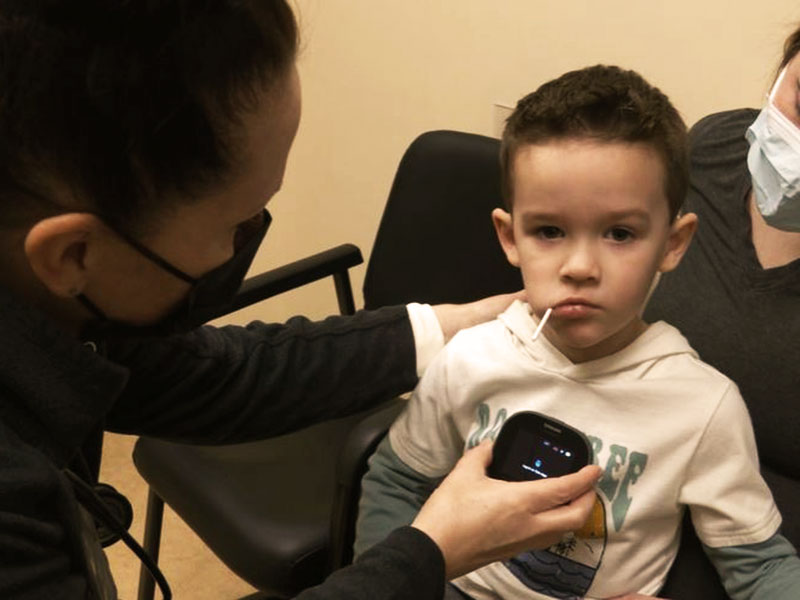Traveling during the winter can be challenging for patients in rural areas across the upper Midwest. Especially for folks who need to travel long distances for health care visits.
Sanford Health continues to make strides in rural health care, and one time-saving tool for patients is virtual care.
Care close to home
James Wallace, M.D., is a pediatric pulmonologist at Sanford Health, treating children with lung issues such as asthma and cystic fibrosis. Dr. Wallace is based in Sioux Falls, South Dakota, but today he’s seeing a patient more than 500 miles — and 7.5 hours — away in Dickinson, North Dakota.
“From my standpoint, I can see the patient, I can listen to them, I can review lab work or breathing tests as needed, and to me, it just seems like a regular clinic visit. I think that it works very well in these situations, especially during the winter months,” said Dr. Wallace.
At the other end of the virtual visit, nurse Ali McLain plays a crucial role in patient care. She not only handles the exam portion of the virtual care visit, but she also assists Dr. Wallace with the Tyto Care technology that allows him to perform his duties. From hundreds of miles away, Dr. Wallace can hear a patient’s heart and lungs, and see their ears and throat.
McLain says the benefits of virtual care are clear.
“When our patients come in, it gives us great comfort that we’re able to care for them here in our hometown, that they can receive the specialized care that they would receive in Fargo or Sioux Falls within minutes of their home,” said McLain.
Specialized medicine
It’s in specialized medicine where virtual care becomes a game changer. Every few months, patients like 7-year-old Mason Titus need to see a specialist like Dr. Wallace.
Mason has cystic fibrosis, and he lives in Scranton, North Dakota, in the southwest corner of the state. The Titus family used to travel six hours round-trip to Rapid City. Now they are just an hour away from the clinic in Dickinson. After just one virtual care visit, his mother Alexis was sold.
“I was nervous about it at first because I didn’t know how it would all work, but with (Dr. Wallace) being able to listen to his heart and lungs, and have somewhere for us to go for a breathing test that he can get the results, I think we’re getting the same care as we would if we would’ve traveled to Rapid City,” said Alexis Titus. “It is just as effective as being there in person because of the things that they have available.
“We still have an hour drive, but that’s nothing when you live around here,” she said with a laugh.
The virtues of virtual care
Dr. Wallace remains a passionate advocate for virtual care as well.
“I have a technology that is the best I’ve ever seen,” said Dr. Wallace. “We have personnel in each of those places that are trained to do this, and I have been impressed by each person in the areas where we’re doing this. About how kind they are, and how well they work with patients, and how committed they are to this too.”
Dr. Wallace has performed around 30 virtual visits since they first became available at Sanford Health in April 2022, helping patients at clinics in Dickinson, Minot, Jamestown and Watford City, North Dakota. He estimates that in those 30 visits alone, patients have saved nearly 250 hours, and more than 15,000 miles, rather than going to see him in-person.
Learn more
- Virtual care key to world-class rural care, says Sanford CEO
- Telemedicine, virtual care save rural patients time
- Sanford Health reimagines rural health care delivery
…
Posted In Children's, Dickinson, Here for all. Here for good., Pulmonology, Rural Health, Virtual Care

